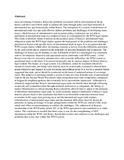| dc.description.abstract | many developing Countries, Kenya has problems associated with its participation in the
in history and have seen efforts made to address the same through policy and legal measures at
international law and domestically within Kenya. The emergence of a system of preferences in
international trade was one such effort to address problems and challenges of developing states
. kenya, which because of administrative and economic policy weaknesses are not able to
participate in international trade on a reciprocal basis as contemplated by the WTO legal regime.
This study is therefore meant to inform on the juridical status of Kenya's international trade
obligations under the WTO legal regime against the background of the problems and challenges
presented to Kenya with specific focus on international trade in sugar. It is recognized that the
WTO escape clauses which allow developing countries a leeway from the difficulties presented by the said system that is centered on the principles of non-discrimination and reciprocity. The challenge for Kenya lies its inability to take full benefit of SDT in a meaningful way consistent with its development objectives and aspirations and in conformity with WTO tenets .:
Until Kenya overcomes its structural, administrative and economic difficulties, the WTO system
is questioned more on the basis of its perceived inequity and its onerous impact on Kenya than its
legal content The impact of a legal system, it is submitted, cannot be examined effectively
outside In words rules, not being value neutral, must be contextually evaluated to discern their actual objectives and impacts in socio-economic and political terms. It is not for a moment herein suggested that trade can or should be conducted on the basis of unilateral actions of sovereign states. The dangers of operating outside a system of rules are clear from the state of international trade in the pre-Second World War period when unregulated inter-state competition culminated in beggar thy neighbour policies that eventually led to an economic depression'.
Although it is ultimately suggested that Kenya's international sugar trade can benefit more through embracing reciprocity and competition than through unilateral preferences or safeguards, the timing of market liberalization is critical meaning Kenya should be allowed time to adjust to the demands of liberalized international sugar trade. A social economic impact examination of Kenya's sugar industry players leads to the conclusion that there is an inexorable connection between local economies in the sugar cane growing areas and the international sugar trade regimes. Liberalization of international sugar trade and the attendant difficulties faced by Kenya in particular in taking advantage of escape arrangements within the WTO are central to this study which also offers recommendations to address the challenges. The withdrawal of Kenya's membership of the WTO under Article XV of the WTO agreement is not considered as a viable option. The conclusion is reached that there exists a case for the strengthening of SDT mechanism within the WTO, and Kenya should find comfort and solutions to any challenges and problems that it may face within The WTO system. | en_US |

